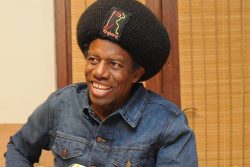In a letter in the May 12th edition of Stabroek News, Dr Jerry Jailall, a civil society advocate defended the invitation to, and presence of President Ali at an Assembly of God (AOG) Youth Group function. His defence came after adverse commentary by an online news entity which had found President Ali’s ‘coziness with Christian Churches worrying’. Dr Jailall, noting that he was a founder member of an Assembly of God Church on the Corentyne, said “People welcoming a President or Opposition Leader with politeness and warmth is a good ‘Christian’ thing in our environment where some push a race card to polarize our people. But Churches are called to be healers within the community. The AOG’s invitation to the youthful President at their Convention is a step in the right direction. Churches have been very silent and aloof at a time when we need them to engage with national development matters”.
The youths of the AOG should certainly be commended for showing initiative and civism in inviting the President to address them. A few days later, the President convened a meeting at the Office of the President with leaders of “various religious organisations”, according to a release from his office, which added that the Head of State brought them together to “discuss the development of a plan in collaboration with the Government to address important challenges and issues our society currently faces.
“He underscored that the partnership aims to build a society that delivers equitable prosperity to every home through the integration of economic, social, cultural and religious philosophies”.
There was no further explanation of the substance of the discussions. Guyana’s secularism is well known and established. As a matter of fact, Article One of the constitutions spells it out where it says in part: “Guyana is an indivisible, secular, democratic sovereign state…” Secular essentially meaning not having any connection with religion or certainly not a dominant religion or some of them.
That has however never detained the presidency of this country from dabbling and engaging with religions in a way that would contravene the constitution. The dilemma is three-fold. First, straightforwardly, all governments since the post independence period have sought to cultivate religions primarily for electoral gain and other benefits. The objects of such ministrations have themselves only been too willing to oblige to strengthen their positions within their respective organizations and to aggrandize in whatever ways were not too unseemly. In Burnham’s period it led to absurdities such as he and the then First Lady being likened to Hindu deities and more recently a suggestion from within this government that if Jesus had returned he would cast a ballot for the PPP/C. There have also been politically inspired attempts to undermine religious organisations which were deemed as potential threats, the early Maha Sabha being a prime example.
Second, there is a completely misguided notion that religionists are somehow better equipped for various state-related and governance tasks than others who should also be engaged under the panoramic Article 13 of the constitution. This explains why the compositions of the Ethnic Relations Commission and the Integrity Commission are heavily predicated on nominations from major religious groups. In the case of the latter in particular there is undoubtedly the view that representatives of the three major religious organisations are possessed of more integrity than other eligible groups and are therefore more dependable in ensuring compliance with the Integrity Commission Act and code. Nothing could be further from the truth. They may come from a background that propounds more ethical behaviour but that isn’t always the practice and there is a great deal of hypocrisy and malign conduct in some of these organisations. Other cohorts such as retired teachers and civil servants with good records should not be excluded from consideration for these positions. To succeed in its task, the Integrity Commission really needs commissioners who can ensure that returns from public officials are properly scrutinized, investigations launched and action taken against those culpable of transgressions and hiding ill-gotten wealth. The relative inactivity of the Integrity Commission may well reflect the decision to rely on commissioners from the major religions. No part of public life in this country, bearing the constitution in mind, should enable preference to be given to any complement of religions or religionists.
Third, the inclination to summon some of the very willing members of the religious establishments to these discourses and for appointments is inherently discriminatory and exclusionary. There are certain groups which are clearly favoured here: the Guyana Hindu Dharmic Sabha – which has historically had longstanding ties with PPP/C governments, the Central Islamic Organisation of Guyana and a series of Christian denominations. So what about the minorities or smaller faiths too numerous to mention? Are their views not worth considering and aren’t they being discriminated against by imposing the dominant views of the major religions which frequently consult with this government and have done so with its predecessors? This is particularly so as the Office of the President release spoke about integrating “religious philosophies” in the goal of “equitable prosperity” to every home. What about atheists, agnostics, mystics, Rastafarians and every other school of thought? Should they be excluded particularly as it is known that some smaller denominations have found a home here after having been persecuted elsewhere.
Religion works best where it exists, in its temples, mosques, churches and all other places of worship. It provides solace to those who find comfort in it and they can adopt and adapt it.
Where the state is concerned, it must not be seen to be entertaining some prominent religions – particularly those it may have traditionally had close ties with – as that infringes upon the secularism enshrined in our constitution. Undoubtedly, there must be room for dialogue and engagement between religions and the government and those can be facilitated through the various ministries as it relates to matters such as culture, education, falling standards, crime etc.
In ending his letter, Dr Jailall said that the government needed to be “commended for always reaching out. At Easter time, Government Ministers are seen attending and speaking at many Christian Churches. The Churches need to engage with the Government especially to make sure we don’t reverse generations of family values, as these are under organized attacks by deviant movements in and out of Guyana”. Whatever Dr Jailall has in mind might be perfectly reasonable but the government would also be aware that it mustn’t be beholden or wedded to any one school of thought on values and “deviant movements” and that secularism must be observed.





